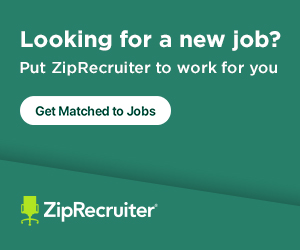- Key Takeaways
- #1. You can show you have the experience
- #2. You have a degree
- #3. You write a personal
cover letter - #4. You’re going the extra mile to share relevant material
- #5. Your
LinkedIn profile is trustworthy - #6. You have volunteering experience
- #7. You speak a foreign language
- #8. Don’t rock the interview; run it
We may earn a commission if you click on a product link and make a purchase at no additional cost to you. For more information, please see our disclosure policy.
Last Updated on June 25, 2025
Key Takeaways
- Highlighting Relevant Experience: Learn how to tailor your resume to showcase your most relevant
skills and achievements. - Crafting a Standout
Cover Letter : Understand the importance of a personalized cover letter in setting you apart. - Optimizing Your
LinkedIn Profile : Ensure your LinkedIn profile is accurate, professional, and aligned withyour resume . - The Value of Volunteering: See how volunteer work can differentiate you from equally qualified candidates.
- Leveraging Foreign Language
Skills : Understand how multilingual abilities can make you a valuable asset to employers. - Mastering the Interview: Discover how to take control of the interview by asking insightful questions and demonstrating enthusiasm.
What makes an employer choose you over another candidate when you have similar
Similarly, catching a glimpse of another applicant, whether through their LinkedIn profile or in the waiting room, can be unsettling. It invites comparisons based on accessible information, such as appearance or the background details visible on a stranger’s online profile.
In other words, comparing yourself to people you don’t know wastes time. Moreover, this behavior is likely to make you nervous before an interview. It’s in your best interest to pay as little attention as possible to other candidates, especially when you are not privy to all the facts.
One individual possesses all the facts—the employer. This person will compare you with other candidates. Many applicants wish they had inside information about potential employers and their companies.
While research has its limits, don’t feel powerless. Even without privileged information, you can still make your application stand out. Use differentiation to your advantage; here are a few ideas to help you begin.
Wondering how to stand out to employers even with similar skills? Discover 8 key factors that make you the top pick—from your LinkedIn strategy to your demeanor in the waiting room. #CareerTips #JobSearch #StandOut #ProfessionalGrowthClick To Tweet#1. You can show you have the experience
There is no denying that the way you present your experience on
Admittedly, recruiters and
Your experience combines your professional duties, responsibilities, and achievements. To put it clearly, what recruiters want is not to see what kind of work you did. They’re interested in how well you managed it. To start, if you’re applying for a junior or mid-level position, you should include detailed descriptions of the relevant positions and briefly mention other positions in your career.
You can list the most pertinent achievements using keywords that match the job description, such as a waitress applying for a customer service job listing her experience delivering positive service and managing customer issues.
The renowned self-assessment exercise clarifies seven key dimensions, so you can uncover your greatest passions, most valued traits, and transferable skills.
#2. You have a degree
Too many candidates apply to positions that require additional education. While there is no discussion that a Recruiter will first consider whether you have the appropriate degree, it doesn’t mean that these roles are off-limits if you have not pursued your academic education before entering the work market.
It is never too late to prepare for a managerial position with an
You can earn your degree faster than on-campus students through specialist study models. In other words, if you’re looking for career progression, it can be advantageous to take the time to add new academic qualifications to
Expert Resume Writers. Affordable prices up front. Try us today and get the job you want! A professionally written resume can get you hired faster and at a higher salary.
#3. You write a personal cover letter
Cover letters might sound like the last thing you want to produce, especially in an age when all it takes to apply for a job is a few clicks. Nevertheless, when most candidates share a common background, your
A clear cover letter can help you convey your brand and value proposition, potentially putting you in the top 2% of applicants. As many candidates create a perfunctory
Use the
Explore Career.io, the only Al and human-powered platform where you can find everything you need. For any step of your job search or career growth. All in one place.
#4. You’re going the extra mile to share relevant material
You can significantly enhance your chances for mid-level to high-level positions by going the extra mile with your recruiter. Show initiative by thoroughly researching the company and industry and preparing insightful questions demonstrating your interest and knowledge. Additionally, tailor
Never miss an opportunity. On ZipRecruiter, top companies reach out to you.
There's no need to look anywhere else. With over 9 Million jobs, ZipRecruiter is the only site you'll ever need to find your next job.
#5. Your LinkedIn profile is trustworthy
The first thing a recruiter checks when they receive your resume is your LinkedIn profile. You must ensure that your profile is up-to-date and mirrors the information you’ve provided in your application. You can be sure that candidates who embellish their resumes get rapidly busted on LinkedIn.
Needless to say, you should pick a tasteful and friendly profile picture without being too unprofessional. However, a recruiter will also be impressed by your endorsements. Indeed, you can boost your endorsement score directly by asking your contacts to endorse you—be sure to promise to do the same for them.
Never miss an opportunity. On ZipRecruiter, top companies reach out to you.
There's no need to look anywhere else. With over 9 Million jobs, ZipRecruiter is the only site you'll ever need to find your next job.
#6. You have volunteering experience
While volunteering experience might not be a game-changer initially, it can make the difference between equally attractive candidates. Indeed, volunteering allows you to learn new
Prove Mastery Through Hands-On Projects
Our open-ended projects are modeled after real-world workplace scenarios, and require in-depth critical thinking and creative solutions.
Succeed with Personalized Feedback
Every project receives personalized feedback from industry experts, and our mentors are available to answer questions whenever you're feeling stuck.
#7. You speak a foreign language
It’s fair to say that unless a job requires you to speak a foreign language daily, most candidates assume that their linguistic
Speaking Chinese, Spanish, or Arabic can be a substantial differentiating factor. Indeed, with 1.2 billion native Chinese speakers worldwide, no business can ignore the language’s importance in trade agreements. Spanish is the second most spoken language in the US, and Arabic gives you access to the Middle East market.
Learn everything you need to have real-world conversations - from vocabulary words to culture. 10 minutes a day is all it takes.
#8. Don’t rock the interview; run it
Lastly, you can use the interview to demonstrate your enthusiasm. Aside from researching the company, you should be preparing questions. Ultimately, a recruiter is looking for someone so excited about the role that they ask most of the questions. Asking about the department’s growth strategy or how to make a difference in the job may not provide clear answers, but it will indicate that you care about the position.
The secret to landing a dream job is to get noticed by the Recruiter at every stage of the process.
Our AI Job Interview Coach is designed to help you train and excel in any job interview from the comfort of your home.
Related posts:
Joey Trebif is the pen name of Mark Fiebert, a former finance executive who hired and managed dozens of professionals during his 30-plus-year career. He now shares expert job search, resume, and career advice on CareerAlley.com.







